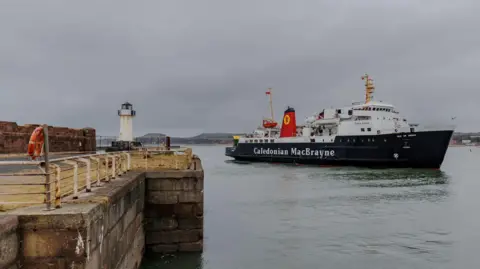Ferry fares under review but 'no decision' on RET
 Getty Images
Getty ImagesThe Scottish government is reviewing west coast ferry fares, but insisted that no decisions have been made on the future of cheaper rates.
It invests about £25m every year to reduce the cost of fares on CalMac crossings under a scheme called road equivalent tariff (RET).
RET applies to both islanders and visitors, and is available on Clyde and Hebrides Ferry Services (CHFS) - including the Western Isles, and Arran-Ardrossan-Campbeltown.
Asked if it could be scrapped for non-islanders, Connectivity Minister Jim Fairlie told BBC Naidheachdan that all options had to be "on the table and then ruled out one by one".
He said fares were being looked at as part of a wider review of the resilience of CalMac's fleet.
Mr Fairlie added: "We are going to look at everything. There are no decisions made on anything at this stage."
What is RET?
RET is a distance-based fares structure and was introduced by the SNP on a trial basis in 2008 on routes to the Western Isles, Coll and Tiree.
It was rolled out across the remaining CHFS routes by 2015.
On the Stornoway-Ullapool route, RET means a single fare for a foot passenger costs £12.30 and £66.75 for cars.
Without the scheme, they would cost £25.75 and £128.70, according to Transport Scotland.
It said single fares on the Oban-Tiree route without RET would cost £22.60 for foot passengers and £135.60 for cars.
Under RET, they are £13.70 and £74.75.
'Supporting islanders'
Mr Fairlie said the review would look at how more revenue could be raised to improve the resilience of CalMac's fleet.
He said: "I think people are wise enough to understand that governments have to look at every possible option."
Mr Fairlie said the Scottish government was committed to supporting island communities.
Transport Scotland said that, under the Islands Connectivity Plan, it was working towards implementing islander and non-islander fares across CHFS and Northern Isles networks.
A spokesperson said: "No final decisions have been taken on the detail of this and there will be engagement with stakeholders in due course."
